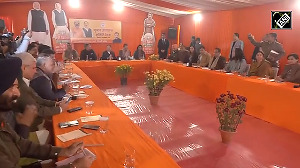The Reserve Bank of India plans to make operational its national electronic funds transfer system in the next two months. NEFT will enable corporates to effect payments and fund transfers from personal computers in their offices on a real-time basis.
RBI is testing the NEFT application that will allow straight-through processing from the desk of any participating corporate, RBI chief general manager-IT, R Gandhi, said at the 2nd EuroFinance conference on "Cash, Liquidity and Treasury Management in India" in Mumbai on Tuesday.
NEFT is a structured financial messaging solution, a domestic parallel of the global Swift system, called Society for Worldwide Interbank Financial Telecommunication.
RBI is also in discussion with the State Bank of India for extending electronic funds transfer to more centres. SBI will next week test integration of its systems with RBI's real-time gross settlement system.
Gandhi said integration of SBI systems with RTGS will put 4,000 branches of the bank on to the RTGS map. After the NEFT stabilises the electronic funds transfer systems would be phased out.
To divert more funds transfers to the EFT system, the minimum requirement of Rs 2 crore per transaction has been done away with. From November 1, 2004 onwards EFT has been made available for electronic transfer of any amount.
By the end of March 2005, 60 per cent of the banking payments will be through the electronic mode, up from 30 per cent at the end of March 2004. In 2002, funds transfers through electronic mode was zero per cent. About 100 centres account for nearly 75 per cent of the banking payments.
Electronic clearing service is available in 45 centres with over 500 corporate customers make use of it for credit as well as debit transactions. ECS credit covers payments of dividend, interest, refunds and salaries.
UTI alone accounts for 600,000 credit entries at a time as it makes payments to its monthly income plan investors. ECS debit facilities are typically used for making payments for utility services like electricity and telephone.
Gandhi said ECS functions on a T+3 settlement cycle and RBI would endeavour to bring down the number of days taken for faster funds movement.
He said ECS settlement on the same day (T+0) would be very difficult to achieve, but RBI can certainly consider bringing it down to T+1.





 © 2025 Rediff.com -
© 2025 Rediff.com -